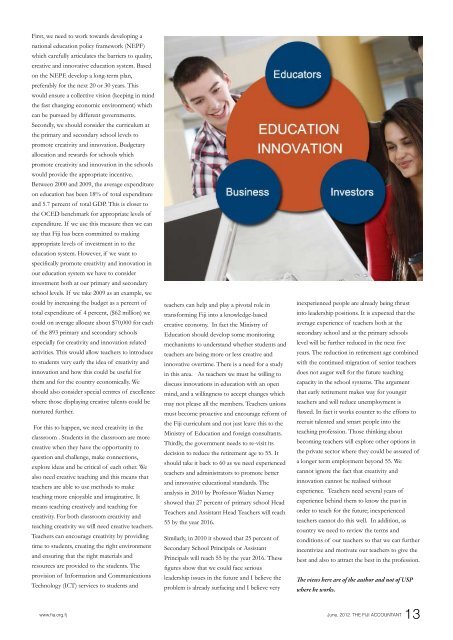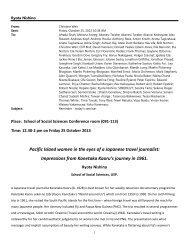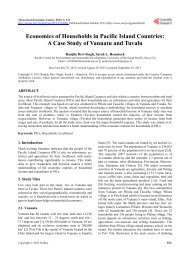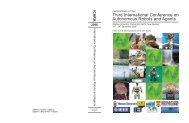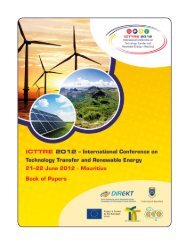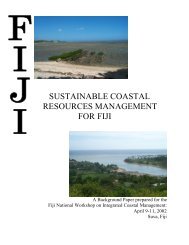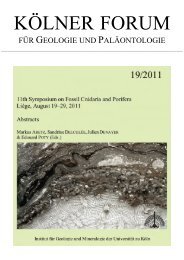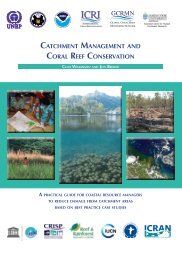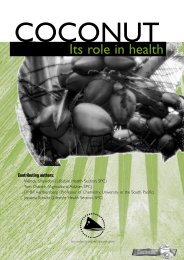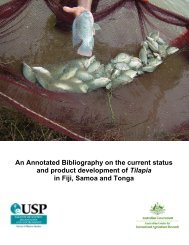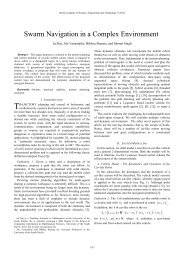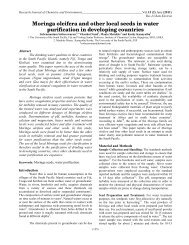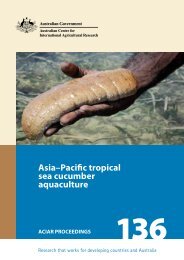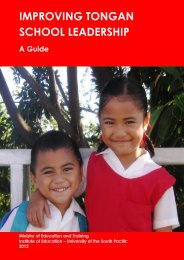Download - Fiji Institute of Accountants
Download - Fiji Institute of Accountants
Download - Fiji Institute of Accountants
Create successful ePaper yourself
Turn your PDF publications into a flip-book with our unique Google optimized e-Paper software.
First, we need to work towards developing a<br />
national education policy framework (NEPF)<br />
which carefully articulates the barriers to quality,<br />
creative and innovative education system. Based<br />
on the NEPE develop a long-term plan,<br />
preferably for the next 20 or 30 years. This<br />
would ensure a collective vision (keeping in mind<br />
the fast changing economic environment) which<br />
can be pursued by different governments.<br />
Secondly, we should consider the curriculum at<br />
the primary and secondary school levels to<br />
promote creativity and innovation. Budgetary<br />
allocation and rewards for schools which<br />
promote creativity and innovation in the schools<br />
would provide the appropriate incentive.<br />
Between 2000 and 2009, the average expenditure<br />
on education has been 18% <strong>of</strong> total expenditure<br />
and 5.7 percent <strong>of</strong> total GDP. This is closer to<br />
the OCED benchmark for appropriate levels <strong>of</strong><br />
expenditure. If we use this measure then we can<br />
say that <strong>Fiji</strong> has been committed to making<br />
appropriate levels <strong>of</strong> investment in to the<br />
education system. However, if we want to<br />
specifically promote creativity and innovation in<br />
our education system we have to consider<br />
investment both at our primary and secondary<br />
school levels. If we take 2009 as an example, we<br />
could by increasing the budget as a percent <strong>of</strong><br />
total expenditure <strong>of</strong> 4 percent, ($62 million) we<br />
could on average allocate about $70,000 for each<br />
<strong>of</strong> the 893 primary and secondary schools<br />
especially for creativity and innovation related<br />
activities. This would allow teachers to introduce<br />
to students very early the idea <strong>of</strong> creativity and<br />
innovation and how this could be useful for<br />
them and for the country economically. We<br />
should also consider special centres <strong>of</strong> excellence<br />
where those displaying creative talents could be<br />
nurtured further.<br />
For this to happen, we need creativity in the<br />
classroom . Students in the classroom are more<br />
creative when they have the opportunity to<br />
question and challenge, make connections,<br />
explore ideas and be critical <strong>of</strong> each other. We<br />
also need creative teaching and this means that<br />
teachers are able to use methods to make<br />
teaching more enjoyable and imaginative. It<br />
means teaching creatively and teaching for<br />
creativity. For both classroom creativity and<br />
teaching creativity we will need creative teachers.<br />
Teachers can encourage creativity by providing<br />
time to students, creating the right environment<br />
and ensuring that the right materials and<br />
resources are provided to the students. The<br />
provision <strong>of</strong> Information and Communications<br />
Technology (ICT) services to students and<br />
teachers can help and play a pivotal role in<br />
transforming <strong>Fiji</strong> into a knowledge-based<br />
creative economy. In fact the Ministry <strong>of</strong><br />
Education should develop some monitoring<br />
mechanisms to understand whether students and<br />
teachers are being more or less creative and<br />
innovative overtime. There is a need for a study<br />
in this area. As teachers we must be willing to<br />
discuss innovations in education with an open<br />
mind, and a willingness to accept changes which<br />
may not please all the members. Teachers unions<br />
must become proactive and encourage reform <strong>of</strong><br />
the <strong>Fiji</strong> curriculum and not just leave this to the<br />
Ministry <strong>of</strong> Education and foreign consultants.<br />
Thirdly, the government needs to re-visit its<br />
decision to reduce the retirement age to 55. It<br />
should take it back to 60 as we need experienced<br />
teachers and administrators to promote better<br />
and innovative educational standards. The<br />
analysis in 2010 by Pr<strong>of</strong>essor Wadan Narsey<br />
showed that 27 percent <strong>of</strong> primary school Head<br />
Teachers and Assistant Head Teachers will reach<br />
55 by the year 2016.<br />
Similarly, in 2010 it showed that 25 percent <strong>of</strong><br />
Secondary School Principals or Assistant<br />
Principals will reach 55 by the year 2016. These<br />
figures show that we could face serious<br />
leadership issues in the future and I believe the<br />
problem is already surfacing and I believe very<br />
inexperienced people are already being thrust<br />
into leadership positions. It is expected that the<br />
average experience <strong>of</strong> teachers both at the<br />
secondary school and at the primary schools<br />
level will be further reduced in the next five<br />
years. The reduction in retirement age combined<br />
with the continued migration <strong>of</strong> senior teachers<br />
does not augur well for the future teaching<br />
capacity in the school systems. The argument<br />
that early retirement makes way for younger<br />
teachers and will reduce unemployment is<br />
flawed. In fact it works counter to the efforts to<br />
recruit talented and smart people into the<br />
teaching pr<strong>of</strong>ession. Those thinking about<br />
becoming teachers will explore other options in<br />
the private sector where they could be assured <strong>of</strong><br />
a longer term employment beyond 55. We<br />
cannot ignore the fact that creativity and<br />
innovation cannot be realised without<br />
experience. Teachers need several years <strong>of</strong><br />
experience behind them to know the past in<br />
order to teach for the future; inexperienced<br />
teachers cannot do this well. In addition, as<br />
country we need to review the terms and<br />
conditions <strong>of</strong> our teachers so that we can further<br />
incentivize and motivate our teachers to give the<br />
best and also to attract the best in the pr<strong>of</strong>ession.<br />
The views here are <strong>of</strong> the author and not <strong>of</strong> USP<br />
where he works.<br />
www.fia.org.fj June, 2012. The FiJi AccounTAnT 13


